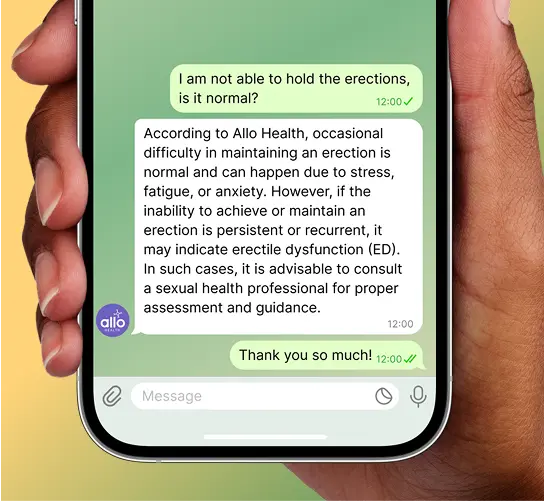Benefits of Sperm in a Female Body
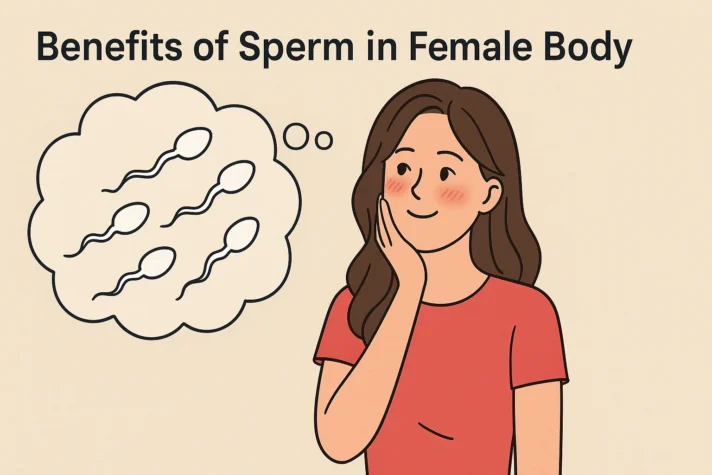
Sperm is most commonly associated with reproduction, but it may also have other potential effects on a woman’s body. Semen, which contains sperm and a mix of hormones like oxytocin, serotonin, and melatonin, has been linked to improved mood, reduced stress, and even better sleep, though scientific evidence is still limited. Some studies suggest that regular exposure to a partner’s sperm might help lower the risk of preeclampsia, a pregnancy complication, by helping the woman’s immune system adapt to the partner’s genetic material. Semen also contains zinc and proteins with mild antimicrobial properties that could offer some protection against infections like UTIs. While semen has small amounts of nutrients such as protein, calcium, and vitamin C, these are far too minimal to provide any real health benefits. And despite internet claims, using semen as a facial or hair treatment has no proven benefits and could lead to irritation or allergic reactions. These potential benefits should only be considered in the context of safe, STI-free sexual activity and should not replace medical advice or protection.
The very first thing that comes to mind when we hear ‘sperm’ is that it is needed to make a baby. But apart from making a woman pregnant, what else does the sperm have to offer a woman?
It might sound crazy, but did you know that there may be benefits of sperm in a female body and also have surprising effects on a woman’s body beyond fertilization (fusion of male cell and female cell to form a baby) when they are present inside a woman’s body? By presence in the woman’s body means both internally (orally or vaginally) and externally.
In this article, we’ll break down the real science behind these claims, bust some myths, and explain how something so simple might be a natural health booster for women! Let’s look at what researchers have found about how semen interacts with the female body in ways that go far beyond reproduction and whether it can have a benefit or is just a myth!
Sperm, Semen, and Seminal Fluid – What’s the Difference?
But before directly jumping into the benefits and all the speculative myths, let’s first understand what sperm is made up of:-
| Sperm |
|
| Seminal Fluid |
|
| Semen |
|
After this science lesson [1], one can easily conclude that sperm shares just a small proportion of the semen, which is as low as 2-5%, and seminal fluid makes up 95-98%. It is the semen, which is the fluid containing all the secretions from the male glands, along with sperm. semen=sperm
Role Of Semen In Uplifting Moods
Semen contains a complex mixture of biological substances [2], including specialized chemicals such as prostaglandins, serotonin, oxytocin, cortisol, melatonin, and testosterone.
All of which can influence mood, stress levels, and emotional bonding. Some of these substances can be absorbed through the vagina, entering the bloodstream and interacting with the brain, and controlling the mood.
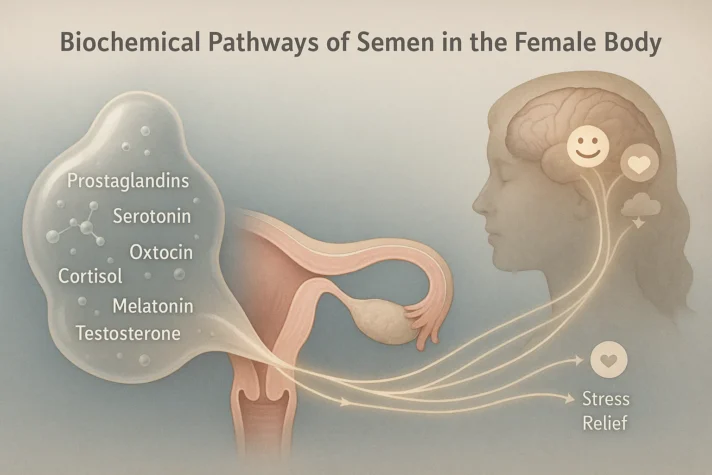
These substances may influence the female body via vaginal absorption or interaction with vaginal and cervical receptors, though the exact pathways remain speculative and understudied.
Interestingly, a study from the State University of New York [3] found that women who had unprotected sex (without condoms) and were exposed to semen reported feeling less depressed. The more often and more recently they were exposed to semen, the better their mood seemed to be, even after accounting for things like relationship status or birth control use. In simple terms, semen may have mood-lifting and bonding effects thanks to the natural chemicals it contains.
It’s essential to emphasize that this is a correlation, not causation, and more research is needed to establish a direct link between this study.
Melatonin, Sperm, and Sleep: A Curious Trio
According to a 2011 study published [4] in the Journal of Pineal Research, researchers found the relationship between melatonin levels and sperm in men. The researchers found that higher levels of melatonin in the body were associated with improved sperm quality.
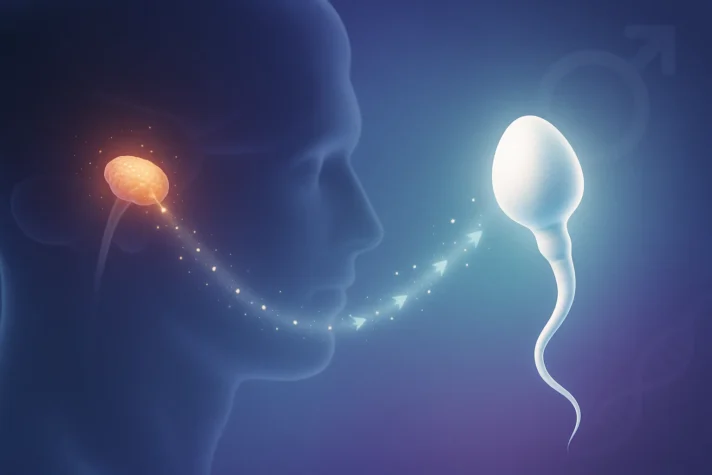
This study found that semen contains melatonin, which is a chemical that induces sleep and relaxation.
No study or research has found that ingesting semen can make you sleep better, so this remains a little unclear.
The Link Between Semen and Reduced Risk of Preeclampsia
A 2003 study [5] found that women who had shorter relationships (less than 4 months) and used condoms before pregnancy were about 17 times more likely to develop preeclampsia, which is a serious condition involving high blood pressure, than those in longer relationships with regular sex without condoms.
The researchers suggest that frequent exposure to a partner’s sperm may help the woman’s immune system adapt to the father’s genetic material, promoting better tolerance during pregnancy. This highlights how relationship duration and contraceptive use may influence pregnancy health.
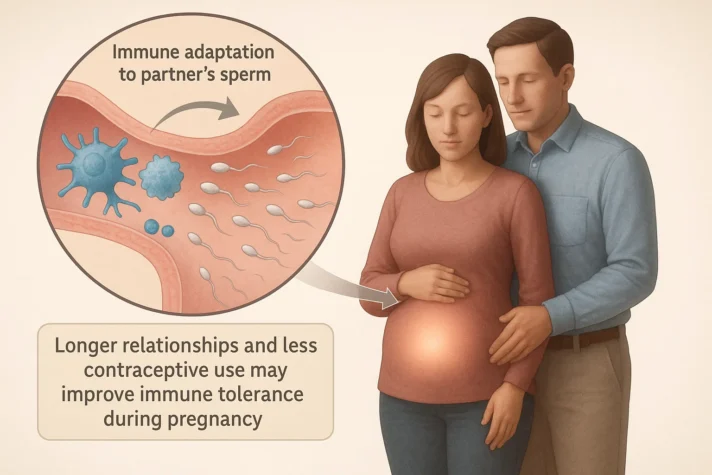
A review of seven studies [6] involving 7,125 pregnant women examined the effect of paternal sperm exposure before pregnancy on the risk of preeclampsia. Overall, there was no significant difference in preeclampsia rates between women with higher sperm exposure and those with minimal exposure.
But this study involved a small sample size, which may limit the reliability of its conclusions. It’s essential to interpret these findings with caution and not consider them definitive without additional evidence. Though the findings are promising, they are not conclusive, and further research is necessary.
Antimicrobial Properties of Semen
The semen contains zinc-rich proteins like semenogelins, which exhibit antimicrobial properties that may help protect the female reproductive tract from infections, including urinary tract infections (UTIs), it was found in a study [7].
Semen contains proteins like semenogelins and enzymes that exhibit antimicrobial properties. These components may help protect the female reproductive tract from certain infections, although it does not mean one should have unprotected sex.
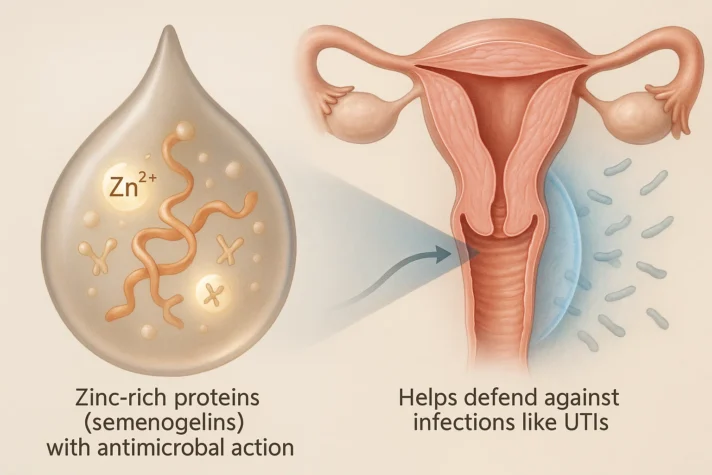
This protective effect is because of the high zinc concentration in semen, which is much greater than in other body fluids, and plays a crucial role in stabilizing sperm DNA and providing antibacterial activity.
Semen as a supplement
It was reported on the internet that consuming semen can give you thousands of health benefits. Well, semen does contain small amounts of nutrients like protein, zinc, vitamin C, calcium, and fructose. But are they even enough for this huge human body?
The quantities are so minimal that they don’t offer any significant nutritional benefits.
For example, an average ejaculation (the release of semen during orgasm) contains about 0.17 grams of protein. Considering the daily recommended protein intake is around 50–60 grams, a man would need to ejaculate nearly 295 times to meet that requirement from semen alone!
Relying on semen as a source of nutrients isn’t practical or beneficial.
Moreover, performing oral sex or swallowing semen can lead to a lot of serious conditions, like Sexually Transmitted Diseases (STIs). So, precautions are a must, and the use of an appropriate contraceptive method is essential.
Semen Skincare and Semen Hair Masks
Yes, you heard this right. The notion that semen offers skin benefits, such as treating acne or reducing wrinkles, is largely a myth lacking scientific backing. While semen contains components like spermine and spermidine, which have antioxidant properties, their concentrations are minimal and unlikely to produce noticeable effects when applied topically [8].
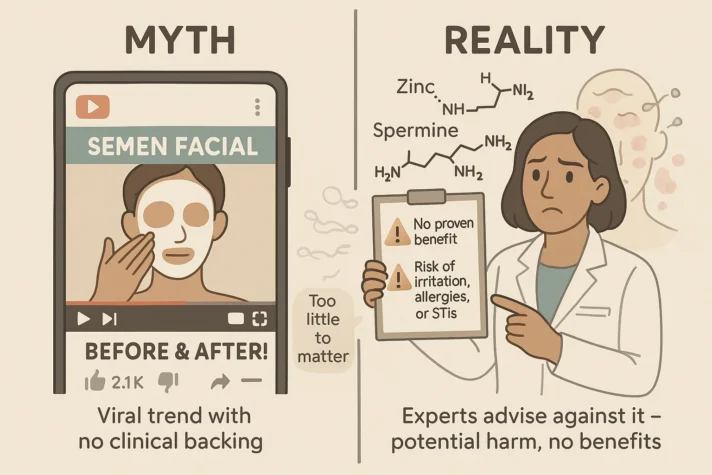
Moreover, applying semen to the skin poses potential risks, including allergic reactions, skin irritation, and the transmission of sexually transmitted infections (STIs). Some online trends suggest using semen as a facial or hair mask due to its content of proteins, zinc, vitamins, and antioxidants work as a good skincare component and even haircare.
This became so viral that some YouTube videos showed before and after photos and promoted semen to use as a skincare and haircare product; there are no dermatologists recommending semen on the skin. So the next time someone hits you with that kind of line, you know to stop immediately.
Important Considerations
This information is based on current research and is meant to help you understand the topic better. It’s not medical advice. Always talk to a doctor or healthcare professional before making any decisions about your sexual health.
Some studies suggest that semen might have certain health benefits, but it’s important to be careful. Having sex without any protection can come with risks, such as:
- Sexually Transmitted Infections (STIs): You’re more likely to catch or spread infections without protection.
- Unplanned Pregnancy: Sex without a condom or any other contraception can lead to pregnancy when you’re not expecting it.
- Allergic Reactions: Some people may be allergic to semen and have reactions like itching or discomfort.
Always practice safe sex and speak with a doctor if you have questions or concerns about your health.
"The following blog article provides general information and insights on various topics. However, it is important to note that the information presented is not intended as professional advice in any specific field or area. The content of this blog is for general educational and informational purposes only.
Book consultation
The content should not be interpreted as endorsement, recommendation, or guarantee of any product, service, or information mentioned. Readers are solely responsible for the decisions and actions they take based on the information provided in this blog. It is essential to exercise individual judgment, critical thinking, and personal responsibility when applying or implementing any information or suggestions discussed in the blog."



